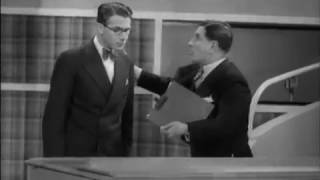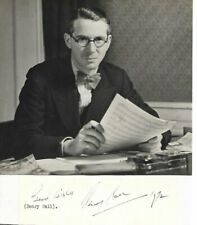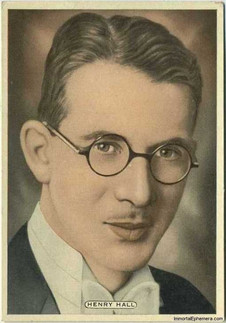Henry Hall and The BBC Dance Orchestra - Record Repertoire
- Lilium

- May 31, 2020
- 4 min read

Henry Robert Hall, CBE, born 2 May 1898, was an English bandleader who performed regularly on BBC Radio during the British dance band era of the 1920s and 1930s, through to the 1960s.

Henry Hall was born in Peckham, South London. He won a scholarship to Trinity College of Music where he studied trumpet, piano, harmony and counterpoint.
His first job was as copyist at the head office of the Salvation Army for which he wrote several marches. During World War I, Hall served with the Royal Field Artillery and played trumpet and piano in the regimental band.
Hall describes in his autobiography, Here's to the Next Time, that on a Thursday in October 1923 he met a young woman, Margery Harker, while traveling by rail to Dartmoor. Hall mentions that he and Margery were about the same age and had much in common, after discussing the C. B. Cochran production of the musical Little Nellie Kelly and Paul Whiteman's take on "Till My Luck comes Rolling Along", a number from the show.
The following day, Henry invited Margery to a dance and proposed to her at the end of the evening. By Saturday, just two days after meeting, the two were engaged and were married in January 1924, at St. George's, Hanover Square, London. Henry and Margery went on to have two children during their marriage.


Hall's musical career was slow to start but eventually he was engaged by the London Midland and Scottish Railway to take charge of music throughout their then large chain of hotels, including Gleneagles Hotel, where he had previously led the band.
In June 1924, on the opening night of the Gleneagles Hotel, Hall persuaded the BBC to broadcast the event on radio, which began his long association with BBC radio.
It was from Gleneagles that the BBC took him in 1932 to succeed Jack Payne as band leader of the BBC Dance Orchestra. At 5.15pm each weekday, Hall's radio programme from Broadcasting House gathered a huge following across the nation. His signature tune was "It's Just the Time for Dancing", and he usually concluded with "Here's to the Next Time".
In the same year he recorded the songs "Here Comes the Bogeyman" and "Teddy Bears' Picnic" with his BBC Orchestra, featuring singer Val Rosing on vocals. The latter song gained enormous popularity and sold over a million copies. In 1934 his popularity was confirmed when his orchestra topped the bill at the London Palladium.
Henry made his first trip to America in September 1933 to learn as much as he could about how US bands performed. He met many musicians including Ben Bernie, Vincent Lopez, Buddy Rogers, Wayne King, Glen Gray, Rudy Vallee, Fred Waring, Irving Mills, George Gershwin and Max Dreyfus. Below is a clip of Hall arriving home from a later trip to America in 1935.
While Henry Hall was on his second trip to US, during the Autumn of 1934, the BBC Dance Orchestra continued to broadcast, and was announced as 'the BBC Dance Orchestra directed by Henry Hall' even though he wasn't there. The press made a story out of him not being there and so on the first night back Hall came on the air and said "This IS Henry Hall speaking!". He continued to do this for a few days and it stuck, and he continued to introduce himself this way for the rest of his career.
He featured in the documentary BBC The Voice of Britain (1935), the source of the "This is Henry Hall speaking" clip much used in documentaries on this period.

Hall's band was one of the first to appear on television featuring in the 1935 film Music Hath Charms (a clip in the video above "Just Little Bit's and Pieces"). The film Music Hath Charms starred Henry Hall, Gertrude Lawrence, and Douglas Fairbanks Junior.
I can not find the film in it's entirety, just little clips of it ranging from the 2 minutes film on the effects of music on animals to the B.B.C Boys being late for a rehearsal with Miss Hildegard.
In 1936 Hall made his first feature film and in the same year he was guest conductor of the ship's orchestra on the Queen Mary’s maiden voyage. He wrote a song especially to perform on the ship "Somewhere at Sea".
In 1937 the BBC Dance Orchestra played at the opening of the Gaumont State Cinema in Kilburn. The same year Hall left the BBC to tour with his own band, which comprised many members of his BBC band, touring the halls of Britain and Europe.
During World War II, Hall played for the troops, and gave concerts and shows in factories all over Britain. Many of these concerts came in the form of "Guest Night" broadcasts. From June to November, 1943, "Guest Night" was replaced by "Henry Hall's Rhythm Entertainment" intended to provide radio entertainment for troops overseas. Later on in 1949, Guest Night would go on to have regular appearances by comedian Max Miller and other guests including Noel Coward, George Formby and Gracie Fields.
Below is the last few minutes of a recording from Monday 15th November 1943 from the BBC Forces Programme "Break for Music".
After the war he developed his show business interests, becoming something of an agent and producer. His BBC work again blossomed as he hosted Henry Hall's Guest Night on the radio and later on television.

In 1955, Hall published his autobiography Here's to the Next Time. He dedicated it to his wife, Margery.
With the rise of television came the idea for a programme, similar to Guest Night, where Henry could sit at the piano and recall his favourite personalities, friends, tunes and stories from his thirty-odd year career. The show was called Face the Music.
He ceased regular broadcasting in 1964
and last appeared as a bandleader in 1969 The following year his service to music was recognised by the award of the OBE and was also appointed a Commander of the Order of the British Empire, CBE.

He died in Eastbourne, Sussex, in October 1989, aged 91.
A green memorial plaque on the site of his former home at 8 Randolph Mews, Little Venice, was unveiled on 2 May 1996.
A blue plaque commemorates Hall at 38 Harman Drive in Cricklewood, London, where he lived between 1932 and 1959.
The video below of Henry Hall and the B.B.C Boys in 1932 chasing after a duck before they played cricket and then going on to play "Here's to the next time" is one of my favourite short films from British Pathé and what I always picture when I think of Henry Hall.












































Comments